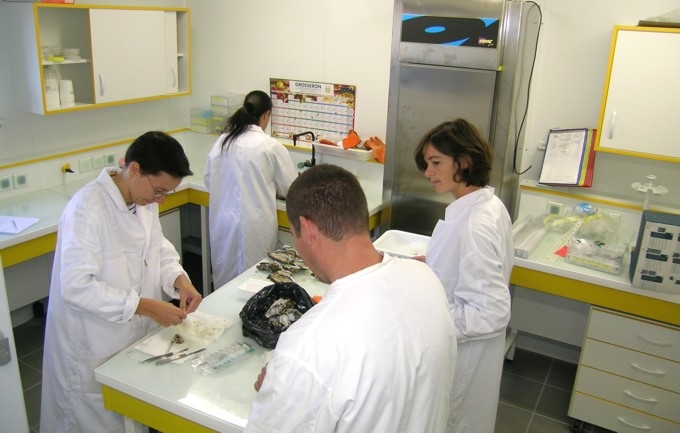Main activities of the EURL
Main European Union Reference Laboratories activities are to:
- Coordinate in consultation with the Commission the methods employed by Member States for diagnosing diseases of bivalve molluscs
- Assist actively in the diagnosis of disease outbreaks in Member States by receiving pathogens isolates for confirmatory diagnosis, characterisation and epizootic studies
- Facilitate the training or retraining of experts in laboratory diagnosis with a view to the harmonisation of diagnostic techniques throughout Europe
- Collaborate as regards methods of diagnosing exotic diseases, with competent laboratories in third countries where those diseases are prevalent.
Picture: Processing Pacific oysters Crassostrea gigas for histology examination (picture J-P. Joly).
Extract from the article 94 Part 1 of EU Regulation 2017/625 (Official Controls Regulation) detailing the responsabilities and tasks of a EURL:
1. European Union reference laboratories shall contribute to the improvement and harmonisation of methods of analysis, test or diagnosis to be used by official laboratories designated in accordance with Article 37(1) and of the analytical, testing and diagnostic data generated by them.
2. European Union reference laboratories designated in accordance with Article 93(1) shall be responsible for the following tasks insofar as they are included in the reference laboratories’ annual or multiannual work programmes that have been established in conformity with the objectives and priorities of the relevant work programmes adopted by the Commission in accordance with Article 36 of Regulation (EU) No 652/2014:
(a) | providing national reference laboratories with details and guidance on the methods of laboratory analysis, testing or diagnosis, including reference methods; |
(b) | providing reference materials to national reference laboratories; |
(c) | coordinating the application by the national reference laboratories and, if necessary, by other official laboratories of the methods referred to in point (a), in particular, by organising regular inter-laboratory comparative testing or proficiency tests and by ensuring appropriate follow-up of such comparative testing or proficiency tests in accordance, where available, with internationally accepted protocols, and informing the Commission and the Member States of the results and follow-up to the inter-laboratory comparative testing or proficiency tests; |
(d) | coordinating practical arrangements necessary to apply new methods of laboratory analysis, testing or diagnosis, and informing national reference laboratories of advances in this field; |
(e) | conducting training courses for staff from national reference laboratories and, if needed, from other official laboratories, as well as of experts from third countries; |
(f) | providing scientific and technical assistance to the Commission within the scope of their mission; |
(g) | providing information on relevant national, Union and international research activities to national reference laboratories; |
(h) | collaborating within the scope of their mission with laboratories in third countries and with the European Food Safety Authority (EFSA), the European Medicines Agency (EMA) and the European Centre for Disease Prevention and Control (ECDC); |
(i) | assisting actively in the diagnosis of outbreaks in Member States of foodborne, zoonotic or animal diseases, or of pests of plants, by carrying out confirmatory diagnosis, characterisation and taxonomic or epizootic studies on pathogen isolates or pest specimens; |
(j) | coordinating or performing tests for the verification of the quality of reagents and lots of reagents used for the diagnosis of foodborne, zoonotic or animal diseases and pests of plants; |
(k) | where relevant for their area of competence, establishing and maintaining:
|
(l) | where relevant for their area of competence, cooperate among themselves and with the Commission, as appropriate, to develop methods of analysis, testing or diagnosis of high standards. |
As regards point (i) of point (k), the European Union reference laboratory may establish and maintain those reference collections and reference strains by contractual outsourcing to other official laboratories and to scientific organisations.
3. European Union reference laboratories shall publish the list of the national reference laboratories designated by the Member States in accordance with Article 100(1).


